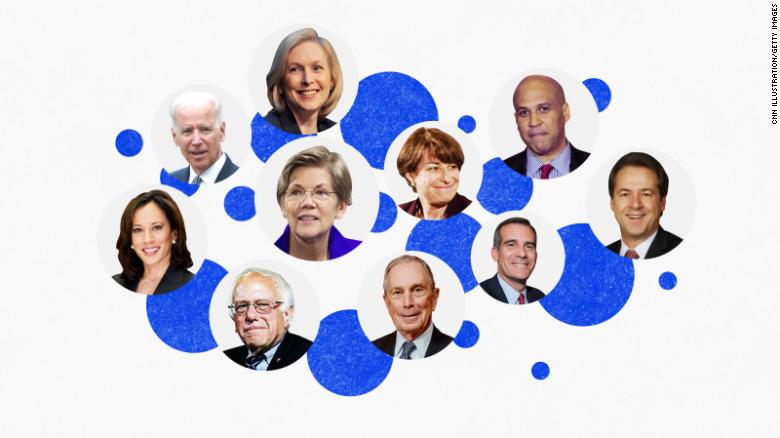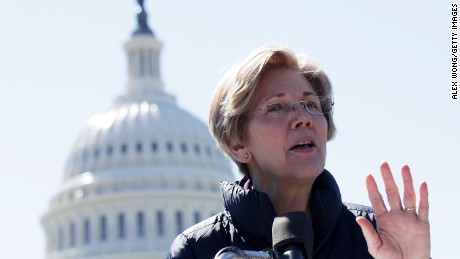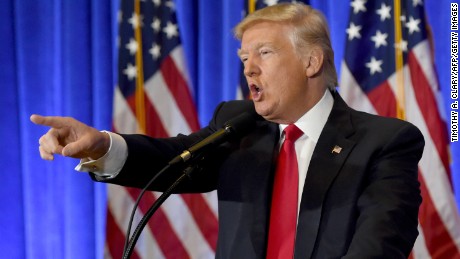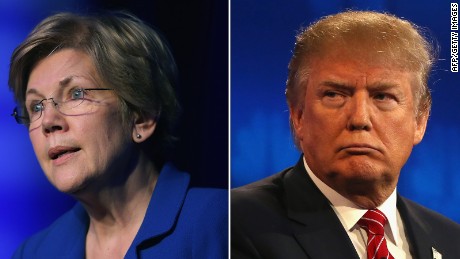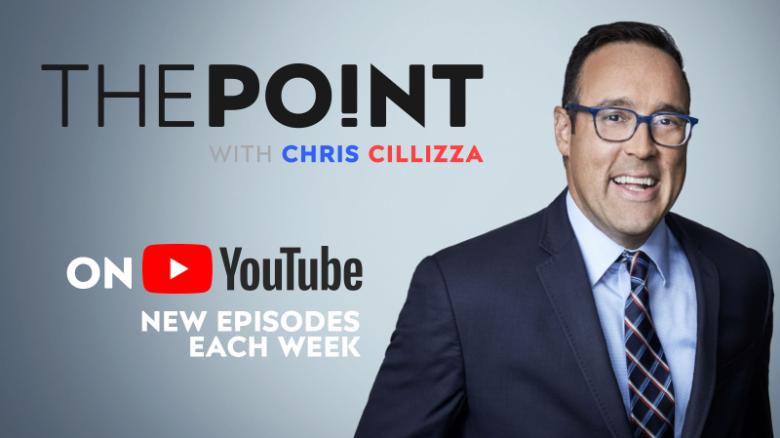(This is the fourth edition of our monthly power rankings of Democrats most likely to get their party's presidential nomination in 2020.)
(CNN)Even before the 2018 election, we already know one of the winners: Women. And Democratic women in particular.
According to the Center for American Women and Politics at Rutgers University, more women have filed to run for office and have won primaries for House, Senate and governor in 2018 than in any past election cycle.
And it's not just women running for (and winning) elected office. Poll after poll of late suggests that women are not only fired up to vote next month, but are leaning heavily toward Democrats.
In a poll by The Washington Post and Schar School of Policy and Government at George Mason University, of the 69 most competitive House seats in the country, women prefer the generic Democratic candidate over the Republican one by a 14-point margin. (Men choose the Republican candidate 51% to 46%).
Those numbers are consistent with what we've seen from female voters in recent months. President Donald Trump's approval rating was just 28% among women in an October CNN-SSRS poll, which, in an election that is shaping up to be a referendum on his first two years in office, is a big problem for Republicans.
And all of those numbers come before the full impact of the Supreme Court confirmation fight over Brett Kavanaugh is factored into the electoral equation. Kavanaugh was narrowly confirmed to the court earlier this month despite allegations of sexual assault or inappropriate conduct against him by women.
The power of women in politics isn't something you can ignore if you are making a list of who Democrats will choose to take on Trump in two years' time. For those who think it is too early to talk about 2020, Elizabeth Warren made it clear Monday that the campaign has already begun. She released results of a DNA test to prove that she has Native American ancestry.
Given all that 2018 has taught us -- and the high likelihood that female candidates and voters deliver the House majority to Democrats -- four of the six politicians we rate as most likely to wind up as the party's nominee in 2020 are women.
Our full top 10 list is below. Don't see your favorite candidate? Don't worry! We will be doing this every month between now and when the party picks its presidential nominee.
(Honorable mention) Eric Holder: Holder isn't in our top 10, though he has been before. Still, we wanted to put his name out there because he does seem like he wants to run. More than that, Holder made his way into the news recently. His comment about "kicking" Republicans when they go low may not have been his most polite moment, but it did make Holder stand out in a large potential field, and taps into the anger many Democrats are feeling during the Trump era.
10. Michael Bloomberg: The former New York City mayor didn't just wake up one day recently and decide he wanted to be a Democrat. Bloomberg has made no secret of his interest in running for president in the past, and re-registering as a Democrat earlier this month is clear evidence he now sees the Democratic Party as his best path to that goal. Bloomberg's billions -- that's "billions" with a "B" -- and his willingness to spend it on political causes means you have to take him seriously. But is a wealthy businessman what Democrats want to nominate against Trump?
9. Steve Bullock: If you subscribe to the belief that presidential primaries are about lanes (e.g. a liberal lane, an outsider lane, a minority lane, etc.), then Bullock's appearance on this list shouldn't shock you. He's basically a placeholder for something different. Bullock is a Western governor with a proven record of winning in a red state. He could claim the outsider label and seems to be intent on running with visits to early and swing states. But does the party really want a white man from a fairly rural Western state (Montana) in a party that is becoming more nonwhite, female and urban-centered? Bullock has his work cut out for him. He didn't even earn 1% of the vote in the latest CNN poll ranking possible 2020 contenders.
8. Eric Garcetti: The Los Angeles mayor is everywhere these days -- if "everywhere" is defined as "states that have early 2020 primaries or caucuses." He was in Nevada in late September. And South Carolina. And New Hampshire. You get the idea; Garcetti is putting in the early legwork to get known among activists in these key states. That's smart, because Garcetti is still very lightly known outside of the City of Angels -- even among the activist set.
7. Cory Booker: Booker's main asset is that he seems to have a keen political sense of where the party is going. His very liberal voting record is a long way from the "neo-liberal" label Booker has previously earned. Booker also has a knack for drawing press (see his "Spartacus" moment during the Kavanaugh hearings), which will be key given that it looks like approximately 2.6 million Democrats will be running in 2020. Yet merely being able to draw a crowd will not be enough to win. It's not clear he drew more positive press than either Amy Klobuchar or Kamala Harris during the Kavanaugh hearings. There are plenty other progressives running. There will be other African-Americans too. Plus, he's not a woman.
6. Amy Klobuchar: Unlike her Senate colleagues Warren, Harris and even Gillibrand, the Minnesota Democrat isn't one of the first names on most Democrats' lips when the conversation turns to 2020. But during the Kavanaugh hearings, Klobuchar distinguished herself in ways no one else mentioned as a Democratic presidential candidate did. Her questioning of Kavanaugh's drinking past became a huge moment -- and one in which Klobuchar shone. If you are looking for a dark horse, you could do worse than Klobuchar.
5. Bernie Sanders: It's tough to rank the runner-up from the last contest lower than fifth. Sanders, like Warren, is well on his way to winning an easy reelection to the Senate. Sanders is a progressive outsider in a party that is going left and seems to want different voices. Yet, if Sanders is building off his 2016 campaign, why did he pull in just 13% in CNN's latest poll? It seems at least somewhat plausible that Sanders' strength in 2016 was in large part because he was the only alternative to Clinton. There are going to be a lot of other contenders this go-round. There will be female candidates who can claim the progressive outsider label. Politicians who are actually Democrats, not independents. Remember: This is a Democratic primary.
4. Kirsten Gillibrand: After receiving a ton of press in 2016 and 2017 about her potential as a national candidate, the New York senator has receded a bit this year. But it's important to remember that it's a marathon, not a sprint. And peaking in October 2018 is totally pointless. What Gillibrand will have going for her if she runs: A liberal Senate record, a fundraising base in a huge donor state and a record as an outspoken voice for women.
3. Joe Biden: Biden has two big factors going for him: He's popular and he's the former vice president to perhaps the most popular Democrat in the country. The CNN poll of the Democratic field reflects his own popularity, with Biden leading with 33%. You may scoff at a poll this early, but keep in mind candidates who lead the field this early tend to be serious competitors once the campaign kicks into high gear. Biden's problems are simple: He's the ultimate insider and a white, fairly moderate, man in a party that seems to be moving the other way on all these factors. Also, you gotta be in it to win it. At this point, it's not clear at all that Biden will actually end up announcing a campaign.
2. Kamala Harris: The kidding around about the California first-term senator running for president is pretty much over. She'll be in South Carolina this week and Iowa next week. And what's interesting is that Harris, despite her relative newness on the national stage, is already something of a known 2020 commodity; the new CNN-SSRS poll showed her in third place in a hypothetical Democratic primary race -- behind only Biden and Sanders.
1. Elizabeth Warren: The case for making Warren No. 1 has, if anything grown stronger since last month. She's well on her way to an easy reelection, and the political environment among Democrats, if anything, is even more geared toward selecting a woman nominee following the Kavanaugh hearings. Warren's progressive and anti-corruption bonafides are a good fit for a Democratic electorate that is moving to the left and seems to want to fight the Trump machine. (Warren recently got into it with White House chief of staff John Kelly.) She is running for reelection under the Democratic brand, unlike Sanders in Vermont, which will likely make her more palatable to the establishment.

